How To Care For A Guinea Pig?
This page contains affiliate links. We may earn money or products from the companies mentioned in this post through our independently chosen links, which earn us a commission. Learn More
General Stats:
- Pet Type: Small pet
- Size: 8 to 11 inches
- Diet: Herbivore
- Lifespan: 4 to 8 years
The guinea pig is also known as the cavy because they are a domestic rodent belonging to the family Caviidae. Guinea pigs may not look much like the pigs you’re used to, but they do have a tendency to squeal when they are hungry.
These pets are gentle and entertaining to keep and they have the ability to bond closely with their human caretakers.
Your furry friend will be your faithful companion, but it may take some time for him to warm up to you. Learn everything you can about pet guinea pig care before you bring your new pet home so you can be sure to cater his habitat to his exact needs and specifications.
Here’s what you need to know about caring for a pet guinea pig.
Habitat Setup For Guinea Pigs
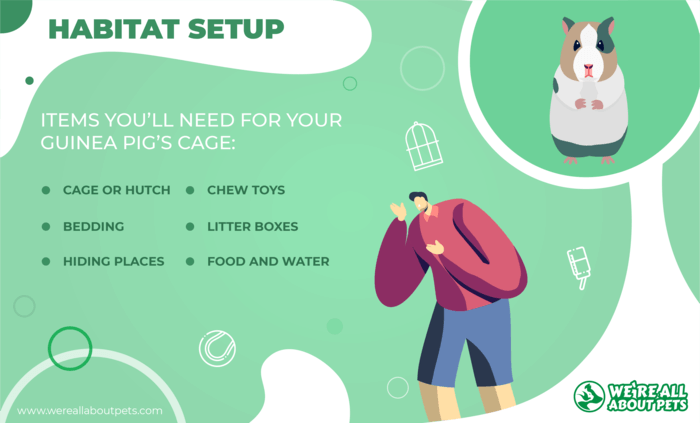
Guinea pigs are active and social animals, so they do best when kept in pairs or small groups.
This being the case, you’ll need to plan for your guinea pig’s cage to be large enough for at least two. Choose a cage with a solid bottom to contain bedding with a wire or mesh top for ventilation.
Here are some of the items you’ll need for your guinea pig’s cage:
- Cage or Hutch – The bigger your guinea pig cage the better – provide at least 7.5 square feet per guinea pig with plenty of open floor space. Make sure the cage is placed out of direct sunlight and away from drafts and air vents that might affect the temperature as well.
- Bedding – Using the right bedding in your guinea pig cage helps reduce odor and moisture. Wood shavings are a good option, just avoid cedar shavings or pine shavings because these types of wood contain oils that can be toxic to guinea pigs. Aspen is a good option.
- Hiding Places – Guinea pigs can be skittish and they often sleep during the day so provide plenty of hiding places. Provide several options for your pets to choose from.
- Chew Toys – Your guinea pig’s teeth grow continuously, so fresh hay and chew toys are essential to keep the teeth worn down.
- Litter Boxes – Some guinea pigs can be litter trained, though many will only poop but not pee in a litter box. Using a litter box in your guinea pig cage can help keep things clean and tidy.
- Food and Water – Look for a food bowl that won’t tip over and one that isn’t easy to chew. You may also want a hay rack to keep the hay off the floor of the cage as well as a water bottle for clean water.
In addition to your guinea pig’s cage setup, consider any additional supplies you might need.
If you have a long-haired breed, for example, you may need to purchase a brush as well. Long-haired guinea pigs require frequent brushing to keep their coats healthy and free from tangles. You’ll also need a set of clippers to trim your guinea pig’s toenails.
Something else you might consider is a playpen for your guinea pig.
These small animals are very active and if you don’t provide a large enough cage, they won’t get the exercise they need. A playpen gives your guinea pigs a bit more space to run and play if you can’t provide a cage quite as large as you’d like.
Also Read: The Cost Of Owning A Guinea Pig
Guinea Pig Diet
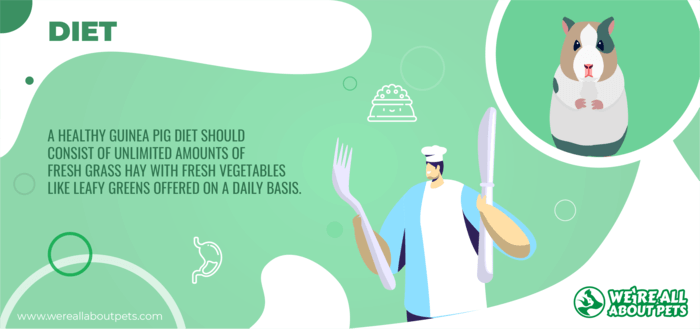
Guinea pigs are herbivores by nature and their digestive system is uniquely adapted to a high-fiber diet.
Like rabbits, guinea pigs have a cecum, an organ connected to the colon and small intestine. This organ contains bacteria that help break down plant material to extract nutrients.
The foundation of a healthy diet for adult guinea pigs is fresh grass hay.
Timothy hay and orchard grass are ideal because they are very high in fiber but low in fat. Alfalfa hay is higher in protein which makes it important to include in the diets of young guinea pigs and pregnant female guinea pigs.
Here are some quick facts about the ideal guinea pig diet:
- A healthy guinea pig diet should consist of unlimited amounts of fresh grass hay with fresh vegetables like leafy greens offered on a daily basis.
- Supplement your guinea pig’s diet with about 1 cup fresh foods per day, focusing on leafy greens like kale, romaine lettuce, and dandelion greens.
- Offer small amounts of low-sugar fruit a few times a week, only a few tablespoons at a time.
- Commercial guinea pig pellets should be offered in small amounts daily to ensure balanced nutrition – make sure they are timothy-based.
- Guinea pigs can’t produce their own vitamin C, so you may need to supplement your pet’s diet by adding vitamin D drops to the water to prevent scurvy.
In addition to food, be sure to provide your pet with unlimited access to fresh water as well. A small animal water bottle is perfectly adequate. Just be sure to clean it and refill it on a daily basis.
Also Read: Can Guinea Pigs Eat Apples?
Guinea Pig Veterinary Care
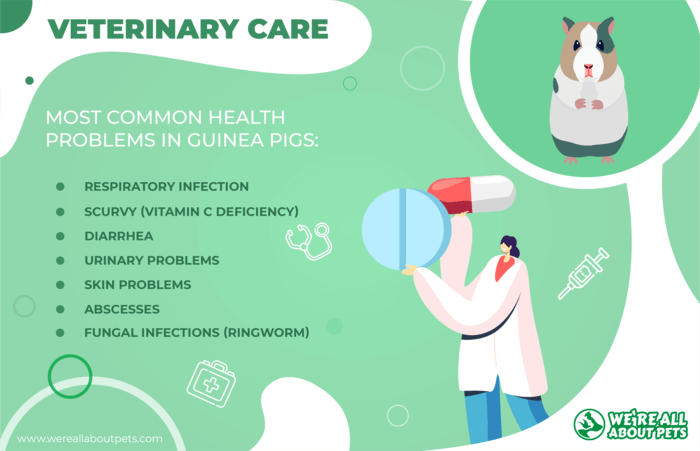
Your guinea pig’s health is determined by a combination of a nutritious diet and proper care. You should take your guinea pig to the vet within a few weeks of first bringing him home and then take him in for annual check-ups to keep an eye on signs of illness and developing health problems.
Here are some of the most common health problems in guinea pigs:
- Respiratory infection
- Scurvy (vitamin C deficiency)
- Diarrhea
- Urinary problems
- Skin problems
- Abscesses
- Fungal infections (ringworm)
Some guinea pig owners consider pet insurance to help offset the cost of vet check-ups and treatments.
You should consider the pros and cons of pet insurance versus saving the monthly premium in case of emergencies. Many plans don’t cover small pets, plus you may spend more in monthly premiums than you would to pay for the treatment itself.
Remember, many veterinarians don’t treat small pets so you may need to find an exotics vet or someone trained to care for guinea pigs. Expect to pay $35 to $50 for a vet appointment.
Guinea Pig Fun Facts
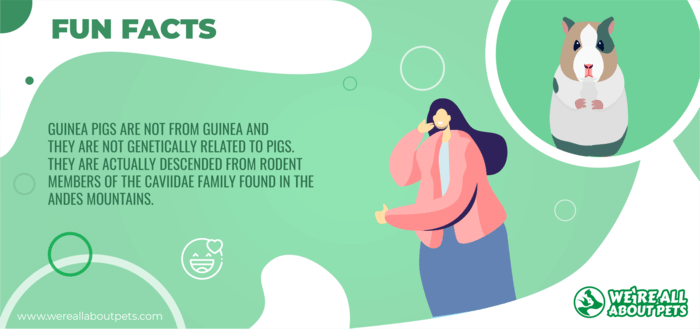
- Guinea pigs are not from guinea and they are not genetically related to pigs. They are actually descended from rodent members of the Caviidae family found in the Andes mountains.
- The guinea pig is very unique when it comes to sleeping habits. These animals are neither nocturnal nor diurnal but are described as crepuscular – most active at dawn and dusk. They tend to sleep in short intervals throughout the day and night, sometimes without even closing their eyes.
- Guinea pigs are similar to rabbits in their digestion because they have a special organ to help digest fibrous foods called a cecum – they also have continuously growing incisors with no canine teeth.
- The guinea pig is a very social animal and tends to thrive best in “herds” with other guinea pigs. In the wild, these herds are led by a dominant male (boar) who breeds with the females.
- Guinea pigs can have up to 5 litters per year with an average gestation period of 59 to 72 days. The average litter size is 2 to 4 babies, though a single litter can contain as many as 8.
- When a guinea pig is very excited, it may hop in the air in an action known as “popcorning” – guinea pigs also emit a variety of squeaks, chirps, and purrs as a method of communication.
- Guinea pigs don’t have the same number of toes on their front and back feet. They have 4 toes on their forefeet and 3 toes on their hind feet.
If you’re looking for a friendly, low-maintenance pet the guinea pig might be a good choice. Like all pets, they require a certain degree of care, but a healthy guinea pig is its own reward.
Frequently Asked Questions
How long do guinea pigs live?
The average lifespan for a pet guinea pig is about 4 to 8 years. Proper guinea pig care and a healthy diet is essential if you want your guinea pig to live as long as possible.
How much do guinea pigs cost?
Guinea pigs are fairly inexpensive pets, especially once you get past the startup costs. At the pet store, you can expect to pay between $10 and $40 for a guinea pig. A large cage will cost $50 to $150 and you may spend an additional $30 to $100 on supplies. You may be able to significantly reduce your costs by adopting a guinea pig because it may come with a cage and accessories.
How big do guinea pigs get?
The average guinea pig grows 8 to 11 inches in length, though there may be some variation between the different breeds.
What do guinea pigs eat?
Guinea pigs are herbivores and should be fed a diet of unlimited fresh grass hay supplemented with fresh veggies and small amounts of low-sugar fruits. Commercial guinea pig pellets can be fed in small daily amounts as well but should be timothy hay-based, not alfalfa.
Are guinea pigs good pets?
Yes, guinea pigs are great pets and often a good choice for older children who can handle the responsibility. Their diet is fairly simple and they respond well to consistent interaction.
Are guinea pigs messy?
Any pet is going to create a certain amount of mess and guinea pigs are no exception. These pets keep themselves pretty clean, however, though they do have a tendency to throw things around their cage, including hay and bedding. You’ll need to clean the cage about once a week to control odor.
Where do guinea pigs come from?
The guinea is a domesticated rodent in the family Caviidae known by the species name Caviidae porcellus. Though the name might suggest otherwise, guinea pigs are not actually from Guinea and they are not biologically related to pigs. These rodents originated in the Andes mountains of South America but do not actually exist in the wild.
Do guinea pigs bite?
Guinea pigs are very gentle animals and they very rarely bite. The only time a guinea pig is likely to bite is if it is very frightened or being mistreated.
Do guinea pigs sleep?
When it comes to their sleeping habits, guinea pigs are a little odd. Guinea pigs tend to sleep in short intervals throughout the day, often without following any kind of set pattern. They are neither nocturnal nor diurnal – they are more accurately described as crepuscular, being most active at dusk and dawn.
How long are guinea pigs pregnant for?
The average gestation period for female guinea pigs is about 59 to 72 days. Guinea pigs have an average litter size of 2 to 4 babies but can have as many as 8.






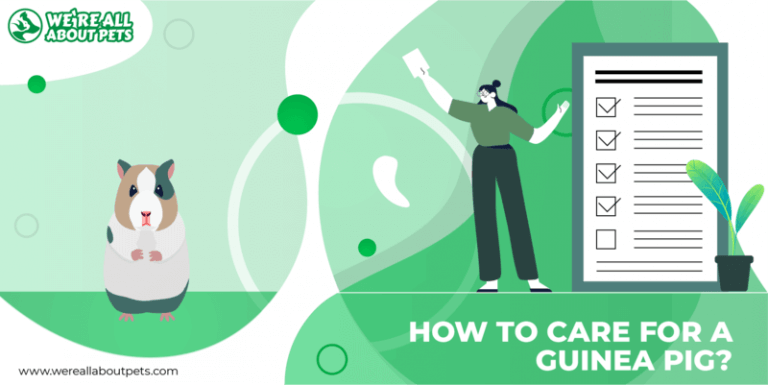
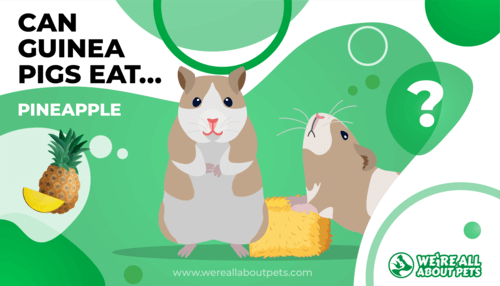
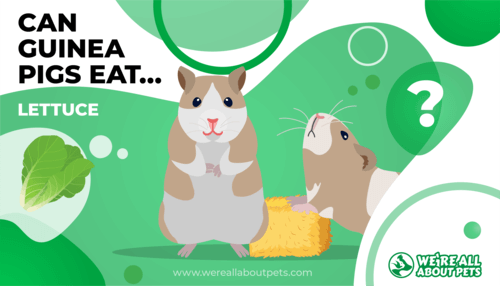
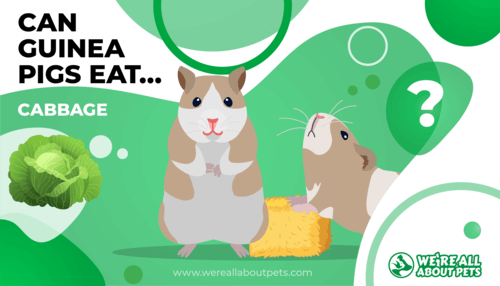
Sharkster
How can I convince my Dad to let me get a Guinea pig? He is veeeeeeeeeeeeery stubborn when it comes to pets.